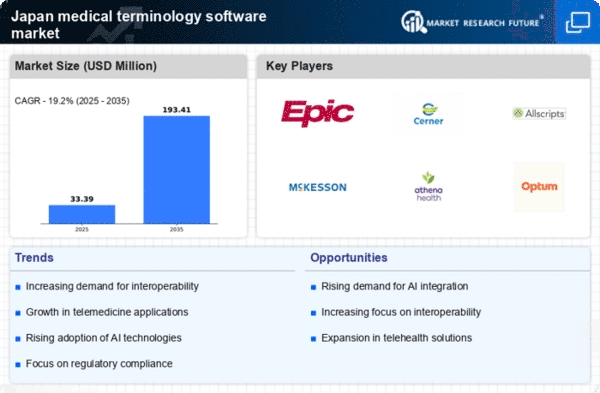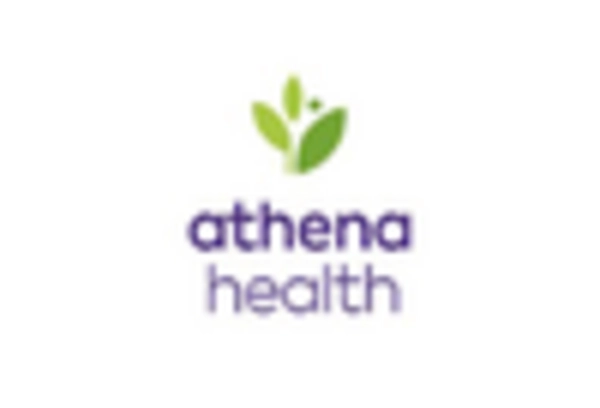Rising Healthcare Digitization
The ongoing digitization of healthcare in Japan is a pivotal driver for the medical terminology-software market. As healthcare providers increasingly adopt electronic health records (EHRs) and digital health solutions, the need for standardized medical terminology becomes paramount. This shift is evidenced by a reported increase in EHR adoption rates, which reached approximately 75% in 2025. Such a trend necessitates robust software solutions that can effectively manage and interpret medical terminology, thereby enhancing communication among healthcare professionals. Furthermore, the integration of artificial intelligence (AI) in healthcare systems is likely to further propel the demand for sophisticated medical terminology software, as AI relies heavily on accurate and standardized data to function optimally.
Increased Focus on Data Security
As the medical terminology-software market expands, the emphasis on data security and patient privacy becomes increasingly critical. With rising concerns over data breaches and cyber threats, healthcare organizations in Japan are prioritizing the implementation of secure software solutions. Regulatory requirements, such as the Act on the Protection of Personal Information, mandate stringent data protection measures, thereby driving the demand for medical terminology software that incorporates robust security features. This focus on data security not only protects sensitive patient information but also fosters trust among healthcare providers and patients alike. Consequently, software solutions that can demonstrate compliance with these regulations are likely to see heightened interest in the market.
Government Initiatives and Funding
Government initiatives aimed at enhancing healthcare IT infrastructure in Japan are a crucial driver for the medical terminology-software market. The Japanese government has allocated substantial funding to promote the adoption of health information technology, with investments exceeding ¥500 billion in recent years. These initiatives are designed to improve healthcare efficiency and patient safety, thereby creating a favorable environment for the development and implementation of medical terminology software. Additionally, regulatory frameworks that encourage interoperability among healthcare systems further stimulate market growth. As healthcare organizations align with these government mandates, the demand for software solutions that can ensure compliance and facilitate seamless data exchange is likely to increase.
Integration of Advanced Technologies
The integration of advanced technologies such as machine learning and natural language processing (NLP) into the medical terminology-software market is transforming how healthcare data is processed and utilized. These technologies enable more accurate coding and retrieval of medical information, which is essential for effective patient care. In Japan, the adoption of NLP in medical software is gaining traction, with estimates suggesting that the market for AI-driven healthcare solutions could reach ¥1 trillion by 2026. This technological evolution not only enhances the efficiency of medical terminology software but also improves the overall quality of healthcare services. As healthcare providers seek to leverage these advancements, the demand for innovative software solutions is expected to grow.
Aging Population and Chronic Diseases
Japan's demographic landscape, characterized by a rapidly aging population, significantly influences the medical terminology-software market. With over 28% of the population aged 65 and older, there is a growing prevalence of chronic diseases that require comprehensive management. This demographic shift necessitates advanced medical terminology software to facilitate accurate documentation and coding of complex medical conditions. The healthcare system's focus on improving patient outcomes through better data management and communication is likely to drive investments in software solutions that can streamline these processes. As healthcare providers seek to enhance their service delivery, the demand for medical terminology software that can support chronic disease management is expected to rise.
















